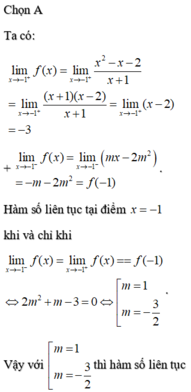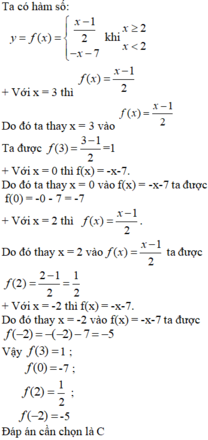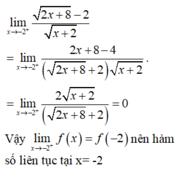Cho hàm số f(x) = mx^2 +2x +2 khi x>0 và nx +2 khi x<=0. Tìm tất cả các giá trị của các tham số m,n sao cho f(x) có đạo hàm tại x=0
Hãy nhập câu hỏi của bạn vào đây, nếu là tài khoản VIP, bạn sẽ được ưu tiên trả lời.


a) Ta có f(x) - 5 \(⋮\)x + 1
=> x3 + mx2 + nx + 2 - 5 \(⋮\)x + 1
=> x3 + mx2 + nx - 3 \(⋮\)x + 1
=> x = - 1 là nghiệm đa thức
Khi đó (-1)3 + m(-1)2 + n(-1) - 3 = 0
<=> m - n = 4 (1)
Tương tự ta được f(x) - 8 \(⋮\)x + 2
=> x3 + mx2 + nx - 6 \(⋮\) x + 2
=> x = -2 là nghiệm đa thức
=> (-2)3 + m(-2)2 + n(-2) - 6 = 0
<=> 2m - n = 7 (2)
Từ (1)(2) => HPT \(\left\{{}\begin{matrix}m-n=4\\2m-n=7\end{matrix}\right.\Leftrightarrow\left\{{}\begin{matrix}m=3\\n=-1\end{matrix}\right.\)
Vậy đa thức đó là f(x) = x3 + 3x2 - x + 2
b) f(x) - 7 \(⋮\)x + 1
=> x3 + mx + n - 7 \(⋮\) x + 1
=> x = -1 là nghiệm đa thức
=> (-1)3 + m(-1) + n - 7 = 0
<=> -m + n = 8 (1)
Tương tự ta được : x3 + mx + n + 5 \(⋮\)x - 3
=> x = 3 là nghiệm đa thức
=> 33 + 3m + n + 5 = 0
<=> 3m + n = -32 (2)
Từ (1)(2) => HPT : \(\left\{{}\begin{matrix}3m+n=-32\\-m+n=8\end{matrix}\right.\Leftrightarrow\left\{{}\begin{matrix}4m=-40\\-m+n=8\end{matrix}\right.\Leftrightarrow\left\{{}\begin{matrix}m=-10\\n=-2\end{matrix}\right.\)
Vậy f(x) = x3 - 10x -2

Trên các khoảng \(\left( { - \infty ;0} \right)\) và \(\left( {0; + \infty } \right)\), \(f\left( x \right) = \frac{{{x^2} - 2x}}{x}\) là hàm phân thức hữu tỉ nên liên tục trên từng khoảng \(\left( { - \infty ;0} \right)\) và \(\left( {0; + \infty } \right)\).
Ta có: \(f\left( 0 \right) = a\)
\(\mathop {\lim }\limits_{x \to 0} f\left( x \right) = \mathop {\lim }\limits_{x \to 0} \frac{{{x^2} - 2x}}{x} = \mathop {\lim }\limits_{x \to 0} \frac{{x\left( {x - 2} \right)}}{x} = \mathop {\lim }\limits_{x \to 0} \left( {x - 2} \right) = 0 - 2 = - 2\)
Để hàm số \(y = f\left( x \right)\) liên tục trên \(\mathbb{R}\) thì hàm số \(y = f\left( x \right)\) phải liên tục tại điểm \({x_0} = 0\). Khi đó:
\(\mathop {\lim }\limits_{x \to 0} f\left( x \right) = f\left( 0 \right) \Leftrightarrow a = - 2\).
Vậy với \(a = - 2\) thì hàm số \(y = f\left( x \right)\) liên tục trên \(\mathbb{R}\).

a: TXĐ: D=R
b: \(f\left(-1\right)=\dfrac{2}{-1-1}=\dfrac{2}{-2}=-1\)
\(f\left(0\right)=\sqrt{0+1}=1\)
\(f\left(1\right)=\sqrt{1+1}=\sqrt{2}\)
\(f\left(2\right)=\sqrt{3}\)

`f'(x) = x^2 - 4x+m`
`f'(x) >=0 <=>x^2-4x+m>=0`
`<=> \Delta' >=0`
`<=> 2^2-1.m>=0`
`<=> m<=4`
Vậy....



Để hàm số có đạo hàm tại x=0 phải thỏa mãn 2 điều kiện, đó là hàm số liên tục tại x=0 và có đạo hàm bên trái bằng đạo hàm bên phải
Để hàm số liên tục tại x=0 \(\Leftrightarrow\lim\limits_{x\rightarrow0^+}=\lim\limits_{x\rightarrow0^-}=f\left(0\right)\Leftrightarrow2=2\left(tm\right)\)
\(f'\left(0^+\right)=\lim\limits_{x\rightarrow0^+}\dfrac{f\left(x\right)-f\left(0\right)}{x-0}=\lim\limits_{x\rightarrow0^+}\dfrac{mx^2+2x+2-2}{x}=\lim\limits_{x\rightarrow0^+}\dfrac{x\left(mx+2\right)}{x}=2\)
\(f'\left(0^-\right)=\lim\limits_{x\rightarrow0^-}\dfrac{f\left(x\right)-f\left(0\right)}{x-0}=\lim\limits_{x\rightarrow0^-}\dfrac{nx+2-2}{x}=n\)
\(\Rightarrow\left\{{}\begin{matrix}m\in R\\n=2\end{matrix}\right.\)
\(f\left(0^+\right)=f\left(0^-\right)\Leftrightarrow n=2\)